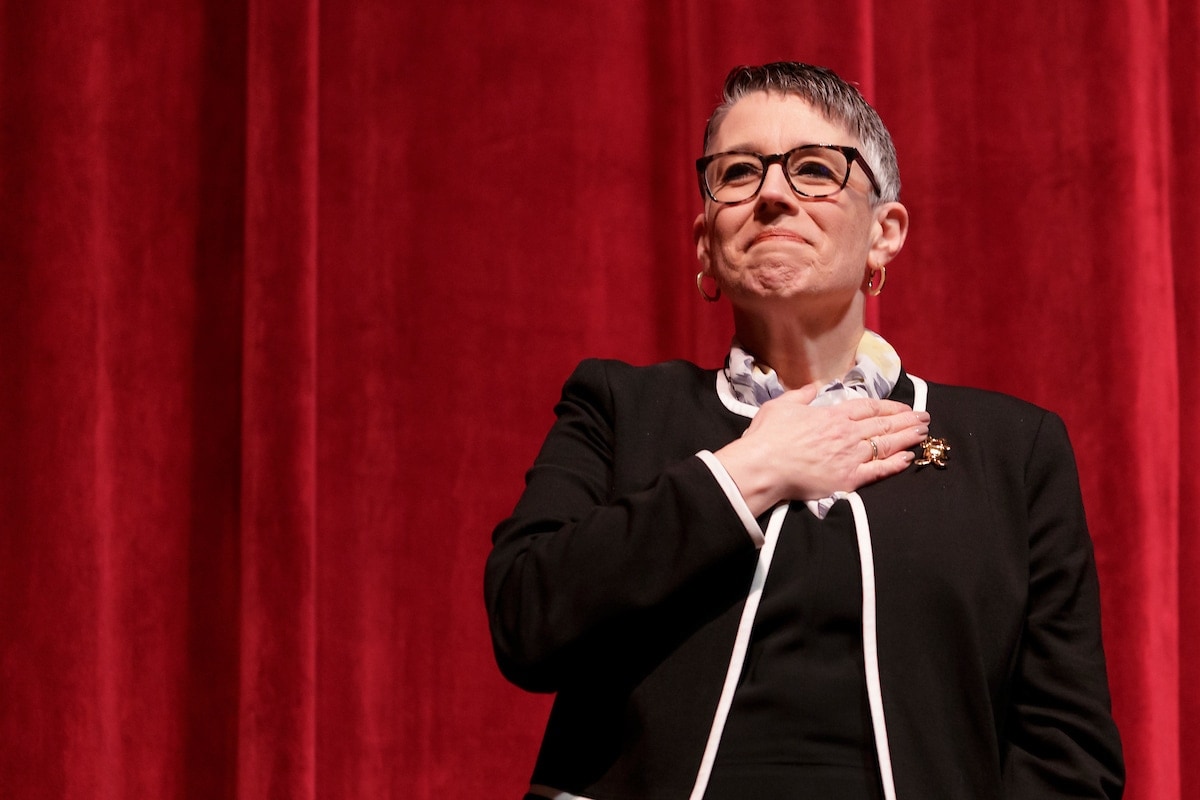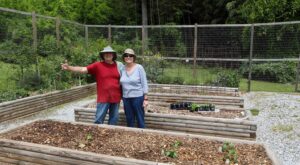
Q: What have you enjoyed most about your first year at Brenau?
A: Oh my gosh, the people. It’s just all about the people, and that’s why I’m doing this, right? It’s about meeting Brenau folks in Gainesville on the historic campus, and every other campus. My rule has been if I’m traveling for Brenau for, say, giving a paper or doing something for accreditation, I want to try to meet alumni or an alumna in that city, and I’ve managed to do it everywhere I’ve gone all year. So it’s the people: It’s the students, it’s the faculty, it’s the staff, it’s the alumnae, it’s the alumni, it’s the trustees, and it’s the community. It’s all about the people.
Q: What surprised you as you learned more about the Brenau community?
A: It’s very interesting because it was mentioned last night at the Zoom open house for the Physician Assistant Studies program. One of our new faculty who hasn’t even taught a student here yet was talking about the combination of a respect for and devotion to history and heritage while being innovative. And I’ve been saying, probably to my colleagues’ dismay, every time I turn around they hear me saying that what I love about this institution is that this is a historic women’s college meeting a comprehensive, innovative university that transforms lives. So she said it much better than I did. I think I’m going to steal the language — but basically, that duality of being so incredibly proud of the heritage, being so incredibly proud of the traditions and knowing that the only way to thrive is to innovate. And people who are willing to do that and to say, “OK, we’ll try that,” or, “How about this?” That combination is unbeatable.
Q: How can we as alums help? What’s most needed during this time?
A: The first thing is, of course, we have a student emergency fund. And we could use your money. I’m going to say it. Because we have students and their families who are being hit hard by this. They’re wanting to come back, or they’re wanting to come and they’re just not quite comfortable enough that they can. It would be wonderful if you could give anything at any level or encourage others to help give at any level. That would be fabulous. I normally wouldn’t start there, but I’m going to start there. I think it’s all about the students.
I think the second thing is, if you’re anywhere near one of our campuses, you could come to events. I would love you to come by when we’re able to travel and visit. That’s why I was really hoping students and alumni would be able to get together at Alumnae Reunion Weekend because I really think our current students could just benefit so much by getting to know you. When we get back to face-to-face, I have some ideas about how we can do that. If you’d be willing to come to orientation or to commencement or to some event once a year, that would be where you would get to meet students. I think that would be fantastic.
And third, just keep in touch with us. Check out our social media. Follow the wonderful alumnae and alumni on social media so that you see what’s going on and you can talk us up — because the more people that know about Brenau, the better. I don’t want to be a hidden gem. I want to be an unhidden gem. Those are just three things.
Q: Can we do something like this in the future during reunion weekend? Because it’s been great, and many alumni haven’t been able to attend in years past.
A: Yes. We don’t have to do it during Alumni Weekend either. There could be an alumni Zoom anytime you want.
Q: A couple of questions about enrollment for international students: How is that coming? And for the students that are accepted to Brenau, how’s it going with getting their visas?
A: We are in better shape than many other institutions on the international front, especially ones I’ve been talking to lately and based on the data I’ve seen. That’s because of two reasons: Number one is we’re not overly dependent. In other words, we don’t have such a high proportion of international students so that if we were to lose some, we would have a problem. I have a colleague who has 2,000 students at her school, and she has 400 international students. You can imagine if half of them don’t come, she’s got a 40% decline. We don’t have that kind of number. We have about 120 in the entire 3,600 student number, so that’s a good thing. I want it to get bigger, but I don’t want it to get disproportional so that we’re over reliant because there are so many variables you can’t control. So that’s number one.
Number two is we are doing our China partnership in partnership, meaning we don’t have to recruit each one of those students and have each one of those students individually do all this paperwork and all of that. That helps. We’re going to be doing a similar thing with our Panama group as well. The challenge that none of us can control is whether we’re going to get the visas in time. But we don’t know what “in time” means yet anyway because we don’t know when we’ll be able to open face-to-face. So the good news with China, which is about 90% of our international students, is that they have already agreed that if we start online or we start face-to-face but they can’t get here, they will go online for as long as they need to. So while we wouldn’t have them on campus to help internationalize the campuses much for that period of time, they would still be learning and it wouldn’t interrupt their education. And it wouldn’t interrupt the fact that they’re part of our student base. So that’s why I want to diversify our international students so that if something were to happen in a certain part of the world, we would not be as vulnerable.
Q: What of the many Brenau traditions is your favorite or possibly surprising?
A: That is like asking which is your favorite child, right? I would have to say that I am pretty moved by Greek sing. This is when they all do their Greek Life songs. I loved it. But I love all the traditions. It’s just one that I was particularly taken by. I had never seen anything quite like that.
Q: Can you tell us a little bit more about the Executive Women’s MBA program and how the residency went in New York?
A: I just want to say a couple things about this program. Number one, it came from the fact that students wanted a program where they would be in a cohort supported by other women and not competing against other women. Number two is they wanted to be taught largely by women. Nobody said it had to be completely women, but they really wanted an experience with mostly women faculty. And that’s pretty rare that you have a program that is, I think, being taught by 80% women. And number three, they wanted it to be partially face-to-face and partially online because their lives do not allow for two or three nights a week face-to- face, which many of our lives don’t. So hybridizing it was the best possible thing to do. And so there’s two residences. The first one was in New York, and it was a week before we started to see COVID-19 in New York. The second one was going to be in China in September. It’s clearly not going to be, but we’re going to move that to the spring. What I love about it is that they’re meeting real world women in leadership positions right now. So they met the producer of a Broadway play, Come From Away. They met with the CFO of one of the major financial houses and with a leader at Diane Von Furstenberg. All these women from different fields, teaching them about leadership and creating a network for them. And the women in this program could be the one’s teaching it. They’re fantastic, and they’re from all different walks of life. They are doing great.
Dr. Juli Clay has been fantastic. Somehow she managed to recruit and launch this program and then become a City Councilwoman while teaching. I don’t know how she did it, but this is why she’s doing it, because she’s a role model. And the next cohorts are being recruited to start next spring. So tell everybody you know about it. There’s no other program with all the qualities we just described.
I understand also that it emanated from a committee that some of our trustees were on, it’s all around The Women’s College and what the future is going to look like. I can take no responsibility, because I showed up and it was going to be about to be launched. And I was super excited to be able to be involved.
Q: You mentioned the new Brenau Physician Assistant Studies program. Can you tell us about the first class that’s been selected or a little bit more about how many people applied and the numbers?
A: Sure, I’m going to be careful about numbers because there’s a whole enrollment funnel, which means you have a lot of people applying that may not be as interested. We pushed the number that we could accept to 33 because there’s so much interest and so much demand. I wish the accreditor would allow us to go up to 50 because the country needs it, but they won’t. We have to demonstrate a successful year and launch and get an initial visit, which is supposed to be in May. And if it’s not in May, it’ll be in July. They’ve done the first round of interviews and placed students, and they will have their second round now. We had around 100 people at the Zoom open house, and there was an open house before that in person. There will be no question that it’ll fill, but you know how people will apply to more than one school. They won’t after they see us, but there were several hundred applications to begin with, so there’s not going to be a problem filling that. They all do multiple rotations. There’s hundreds and hundreds of spots that had to be secured at hospitals, nursing homes and doctor’s offices, and the team worked and got that done. So we’re going to sail through the accreditation, I have no doubt, and then I hope we’ll be able to push it. I keep telling the dean, the program director and the provost, “Let’s get that number up because our country needs more health care professionals.”
Q: One final question. What are you most looking forward to in the upcoming year at Brenau?
A: OK, I’m not going to say leaving the house, but I am looking forward to that. I would say I’m excited to get really into the strategic plan. It’s where we figure out what we’re going to be, what is sacred that we’re going to keep, what we’re going to do differently or what we need to do in addition to the changes. That process working with all different constituencies is going to be super exciting. I can’t wait to sit down with the students, sit down with an alum, a trustee, a faculty member, a staff member and say, “What are we going to be in our next 142 years?” I can’t promise I’ll be there for that whole period. But what are we going to be for the next short period of time? Three, five years, what’s it going to look like? That is going to drive so much creativity and innovation. So it’s that process that I’m really looking forward to. Among many other things, but I’ll put that at the top.

